Mastering Your Time: How an Athlete’s Discipline Translates to a Career

I thought I had it all figured out. In high school, balancing sports, friends, and school felt effortless. But when I stepped onto the college campus, reality hit hard. The demands of college athletics and academics blindsided me, and I quickly found myself drowning in a sea of responsibilities.
Most people don’t realize the depth and speed of learning required to be a college athlete. It’s not just about showing up to practice and playing games. There’s film study, strength and conditioning, nutrition, and strategic planning—it’s like taking an extra class on top of your regular coursework. The physical and mental drain was real, and I felt like I was constantly playing catch-up.
But the most important lesson I learned wasn’t on the field; it was about time management. The discipline that made me a successful athlete was the same discipline that I needed to master my schedule, and this is the most valuable skill you can take with you into a professional career.
The Reality of a Student-Athlete’s Schedule
Before we dive into strategies, let’s look at some eye-opening statistics that highlight the time management challenges faced by student-athletes at both the high school and college levels:
- High school athletes spend an average of 10-15 hours per week on sports-related activities during their season, with many dedicating even more time.
- According to the NCAA, college athletes across all divisions spend an average of 32 hours per week on athletics and 40 hours per week on academics during their season.
- A study found that 80% of student-athletes report feeling overwhelmed by their responsibilities at some point during their academic year.
- Even in the off-season, many student-athletes maintain a rigorous schedule, with 67% reporting they spend as much or more time on athletics as during their competitive season.
These numbers underscore the importance of developing strong time management skills to successfully balance athletic and academic demands, and they serve as a powerful metaphor for the demands of a professional career.
Learning to Manage and Maximize Limited Time
It took many hard lessons and ego hits, but I eventually learned to take control of my time. I did this by:
- Creating an organizational system: Blocking out dedicated time for studying, training, and friends helped me see where my time was going and identify areas for improvement. Suddenly, I could see opportunities to make the most of every hour.
- Embracing disciplined routines: Scheduling time with university tutors sounded like more work than I wanted to deal with, but it actually saved me a lot of time. Once I was meeting with a tutor, I didn’t have difficulty starting homework, I stayed on task, and I received help when I was stuck.
- Recognizing the importance of recovery: I turned off my phone, focused as hard as I could when it was time to work, and fully decompressed when it was time to take a break. This allowed me to be more efficient and opened up free time, therefore decreasing the potential of burnout. The quality of my work and training improved dramatically.
These simple changes made a world of difference in my college experience and set me up for success. Research backs the impact of effective time management: Stanford University found that students who employ effective time management techniques can reduce their study time by 30% while improving their grades.
Adapting Your Discipline to a Job Search
As a student-athlete, your time management approach shifts dramatically throughout the year. The same adaptability is needed for a successful job search, as you move through different stages of the process.
Off-Season: Building a Strong Foundation
The off-season is the perfect time to focus on academics and lay the groundwork for future success. In the job search, this translates to:
- Investing in networking and front-loading outreach efforts.
- Building your personal brand on platforms like LinkedIn.
- Improving your resume and portfolio.
- Practicing your interview skills while the stakes are low.
In-Season: Staying Focused Under Pressure
When the job search is in full swing, you must stay focused and adaptable to maintain your performance. This means:
- Maximizing efficiency to stay on top of applications and follow-ups.
- Communicating proactively with recruiters about your schedule.
- Prioritizing self-care for peak physical and mental performance.
- Seeking support to avoid feeling overwhelmed and maintain clarity.
Micro-Productivity: Using Small-Time Windows
With student-athletes spending an average of 60 hours per week on sports and academics combined, making the most of every available moment is crucial. This skill is directly applicable to a busy job search.
Here’s how to leverage small pockets of time:
- Quick Review: Use 10 minutes to review key concepts or practice your elevator pitch.
- Mental Rehearsal: Visualize a successful interview on your bus ride to a meeting.
- Follow-Up: Use the downtime between meetings to send quick follow-up emails.
Remember, small pockets of time add up. Using these for productivity, rather than scrolling on your phone, will give you much-needed free time later.
By applying the discipline you’ve learned as an athlete to your job search, you’ll be able to manage the process more effectively, avoid common pitfalls, and ultimately, land a job that’s the right fit for you.

